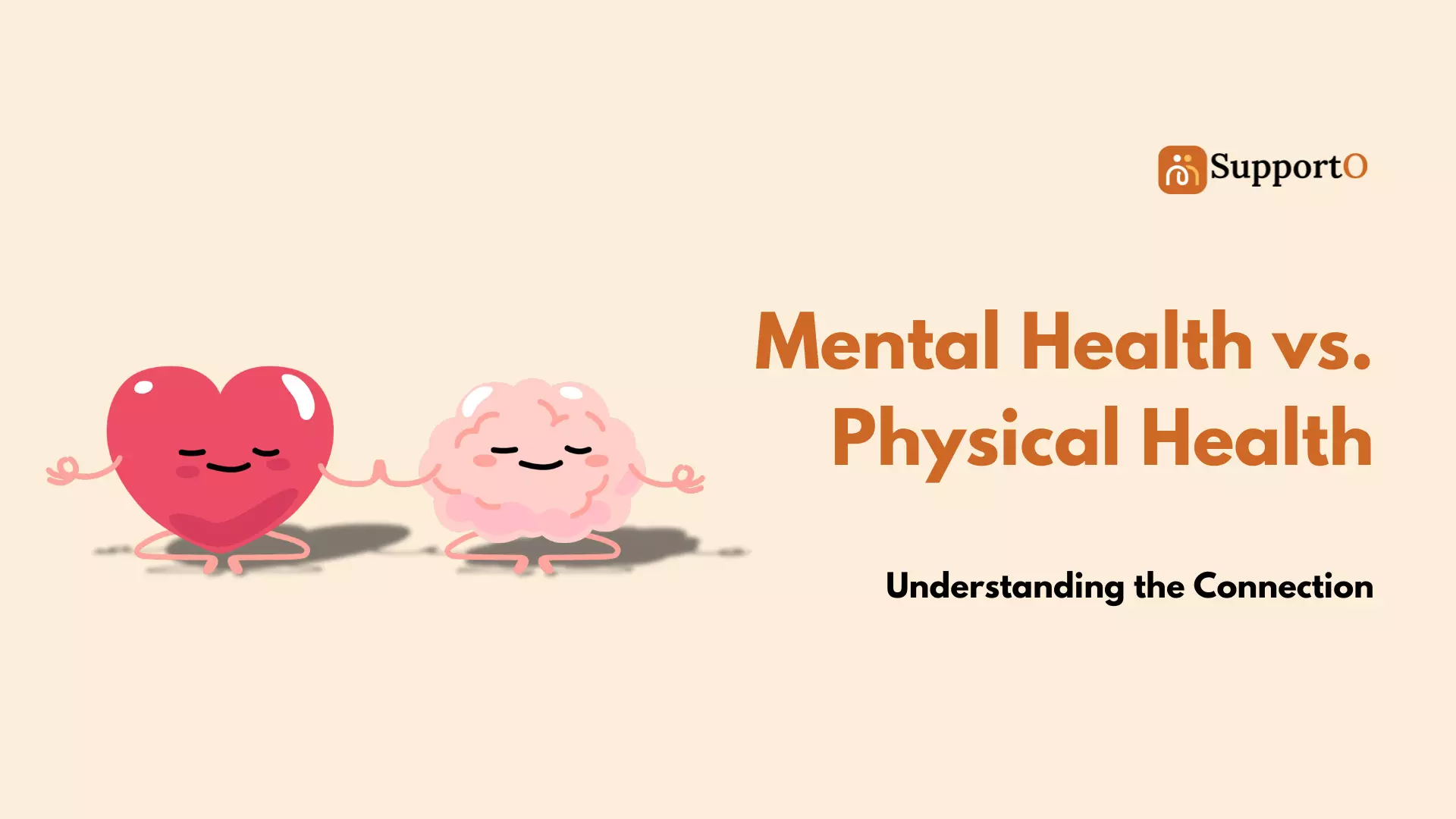Mental Health vs. Physical Health: Understanding the Connection
When people hear the word health, most of us associate it with something physical — exercise, nutrition, doctor visits. Now, as much as physical health is important, so is mental health to live a life of balance. Emotional health is important because it can empower you to live a full and active life. Mental health and physical health have unique features that make them distinct from one another, but they are profoundly interdependent and influence one another in many respects.
In this blog, we will discuss what is mental health and what is physical health, the difference between them, as well as interrelation, and how platforms like SupportO can help you in providing the necessary emotional platform support to ensure your wellbeing.
Mental Health vs Physical Health: What’s the Difference?
Physical Health
Health in physical terms means the body and its proper functioning. It includes:
1. Regular exercise
2. Proper nutrition
3. Sufficient sleep
4. From prevention to treatment of the disease
5. A strong immune system
A healthy person physically has the strength to do daily chores, combat infections, and live a better quality of life.
Mental Health
Mental health refers to our emotional, psychological, and social well-being. It impacts our thoughts, feelings, and behaviors throughout the day. Having good mental health means that we can:
1. Cope with daily stressors
2. Make decisions effectively
3. Develop and sustain relationships
4. Become resilient when things are hard
The Interconnection Between Mental and Physical Health
Though mental and physical health are talked about separately, they are closely related. Here are some of the major ways they affect one another:
1. Chronic Illness and Mental Health: Long-term illnesses, such as diabetes, heart disease, or chronic pain, can be stressful and, at times, even depressing, causing difficulty for individuals to maintain emotional stability.
2. Mental Health and Physical Health: Stress and depression have been found to cause headaches, fatigue, digestive issues, and susceptibility to infections, further demonstrating the interdependence of emotional and physical health.
3. Exercise and Mental Health: Physical exercise can help in relieving stress and reduce anxiety by releasing “feel good” hormones — endorphins.
4. Sleep and mental health: When you sleep poorly, your chances of succumbing to mood disorders increase, while stress levels can hike, and you may find it impossible to concentrate, impacting mental health and physical endurance.
5. Good Nutrition and Mental Health: Proper nutrition is essential for stability in the body and stable emotions, ensuring that the person does not feel emotionally unwell.
Differentiating Between Mental Health Issues and Physical Health Issues
To prevent these conditions from worsening, it is important to be aware of the signs of both mental and physical health issues.
Common Signs of Mental Health Problems:
1. Being more irritable or moody
2. Loss of interest in things you used to enjoy
3. Problems with focus or making decisions
4. Social interaction withdrawal
5. Altered sleep or appetite
Physical Signs of Health Issues:
1. Chronic pain or discomfort
2. Headaches or migraines regularly
3. Weakened immune system
4. Fatigue and low energy levels
5. Trouble breathing or pain in the chest
6. Unexplained weight loss or gain
Managing Mental and Physical Health Together
Because one’s mental and physical health are inherently connected, a holistic, whole-body approach is crucial for optimal well-being. Here are some tips for effectively navigating both:
1. Prioritize Self-Care
Listening to the subconscious body and practicing self-care like meditation and exercise, helps to retain a place of equilibrium which could prove valuable for both emotional and physical health.
2. Seek Professional Help
For persistent mental health issues, reaching out to a therapist, counselor, or an emotional platform like SupportO can be extremely beneficial. Talk to your network about your needs and how to get the support you need while being a supportive listener as well as recipient of support when you need the help.
3. Build a Support System
Stress, anxiety, and emotional struggles can be handled properly when one has friends and family who support him. Actively cultivate meaningful relationships with friends, family, trusted colleagues, and socialize with people you can count on join support groups, eat well, exercise, practice mindfulness, get enough sleep, and avoid self-medication.
4. Maintain a Healthy Lifestyle
Good nutrition, proper hydration and regular movement all play their part in developing a healthier mind and body.
5. Stress Management Techniques
Meditating, writing in a journal or picking up hobbies also helps reduce stress and can save one from spiraling into stress and depression.
The Role of Emotional Platforms Like SupportO
With the rise of awareness of mental well-being, platforms such as SupportO contribute significantly to mental health care. Whether it be stress and depression, relationship woes, or workplace burnout, SupportO connects people with expert counselors, self-help resources, and a community of emotional support, anonymously.
Conclusion
Mental health and physical health are both important parts of a satisfying life. There is always a trade-off, so ignoring the one will adversely affect the other, balancing them is a must. With a proper understanding of symptoms, adequate preventive healthcare measures, and supportive programs such as SupportO, people can live vastly healthier lives. Balancing emotional and physical health will help create a solid foundation for happiness, success, and resilience in today’s fast-moving world.
